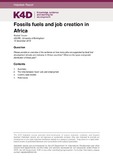| dc.contributor.author | Cooper, Rachel | |
| dc.coverage.spatial | Angola | en |
| dc.coverage.spatial | Ghana | en |
| dc.coverage.spatial | Nigeria | en |
| dc.coverage.spatial | Sudan | en |
| dc.coverage.spatial | Uganda | en |
| dc.date.accessioned | 2020-01-23T11:59:17Z | |
| dc.date.available | 2020-01-23T11:59:17Z | |
| dc.date.issued | 2019-11-15 | |
| dc.identifier.citation | Cooper, R. (2019). Fossils fuels and job creation in Africa. K4D Helpdesk Report 697. Brighton, UK: Institute of Development Studies. | en |
| dc.identifier.uri | https://opendocs.ids.ac.uk/opendocs/handle/20.500.12413/14987 | |
| dc.description.abstract | Fossil fuel development, including oil, gas and coal, can provide or support employment in a number of different ways1. Estimates for Africa’s extractive sector as a whole put it as employing less than 1% of Africa’s workforce (Fine et al., 2012). However, it is hard to determine the number of jobs supported directly or indirectly by the fossil fuels industry in different African countries due to a paucity of publicly available data and a lack of robust data. This rapid review includes case studies of five African countries (Angola, Ghana, Nigeria, Sudan and Uganda) including information on their local content policies and government requirements for employing locals and procuring goods and services from local companies. A number of developing countries in Africa with fossil fuel industries have developed local content policies to stimulate local employment and backwards linkages. These policies have had mixed success (Ackah & Mohammed, 2018). Information on whether local content policy requirements are being followed or implemented is limited for the countries included in this review. For example, it is difficult to assess the success of Angola’s local content policy due to a lack of openness and inadequate monitoring and evaluation (Ovadia, 2014). Information related to gender was extremely difficult to locate2. Gender specific information was only found for Sudan, where 6% of people employed in the extractive sector are women (UNCTAD, 2016). Information on the types of jobs supported was also difficult to locate, aside from Ghana, where a 2015 government estimate suggests that targets for direct local employment were met for management and other staff, but gaps remain for technical staff. | en |
| dc.language.iso | en | en |
| dc.publisher | IDS | en |
| dc.relation.ispartofseries | K4D Helpdesk Report;697 | |
| dc.rights.uri | https://www.nationalarchives.gov.uk/doc/open-government-licence/version/3/ | en |
| dc.subject | Climate Change | en |
| dc.subject | Economic Development | en |
| dc.subject | Environment | en |
| dc.subject | Gender | en |
| dc.subject | Rights | en |
| dc.title | Fossils Fuels and Job Creation in Africa | en |
| dc.type | Helpdesk | en |
| dc.rights.holder | © DFID - Crown copyright 2019 | |
| dcterms.dateAccepted | 2019-11-15 | |
| rioxxterms.funder | Department for International Development, UK Government | en |
| rioxxterms.identifier.project | K4D | en |
| rioxxterms.version | VoR | en |
| rioxxterms.funder.project | 238a9fa4-fe4a-4380-996b-995f33607ba0 | en |

